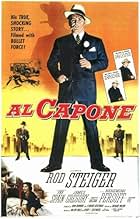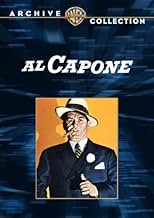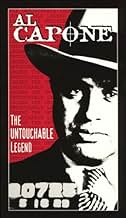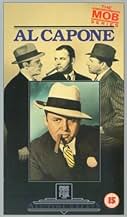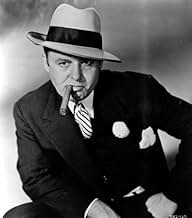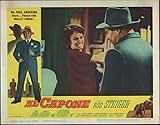CALIFICACIÓN DE IMDb
6.7/10
2.1 k
TU CALIFICACIÓN
El ascenso y caída de Al Capone como jefe criminal de Chicago durante la Prohibición.El ascenso y caída de Al Capone como jefe criminal de Chicago durante la Prohibición.El ascenso y caída de Al Capone como jefe criminal de Chicago durante la Prohibición.
- Dirección
- Guionistas
- Elenco
- Premios
- 1 premio ganado y 1 nominación en total
Raikin Ben-Ari
- Ben Hoffman
- (as Ben Ari)
Fred Aldrich
- Funeral Spectator
- (sin créditos)
Cindy Ames
- Nurse
- (sin créditos)
- Dirección
- Guionistas
- Todo el elenco y el equipo
- Producción, taquilla y más en IMDbPro
Opiniones destacadas
This 1959 picture is yet another cinematic retelling of the life of mobster Al Capone, and is better than most I've seen. Rod Steiger as Big Al seems miscast at first but wins me over in the end. Steiger was a born ham, but a fine actor for all his Methodish mannerisms, and has moments in the movie in which he's almost hypnotically effective. Yes, it's a performance, I kept on telling myself, but so was Capone himself. Over the top, perhaps, but Capone was himself more than a little touched, and Steiger nails this aspect of Capone to perfection, and is more effective in capturing the big guy's capriciousness than Robinson or Muni before him. Steiger's Capone isn't merely a gangster, he's a man possessed.
Director Richard Wilson's keeps this fairly modestly budgeted film moving at a fast pace, and it's never boring. In supporting roles, Fay Spain, Martin Balasm, James Gregory and Nehemiah Persoff are all effective. The black and white of this film evokes the late fifties more than the roaring twenties, and the movie at times feels a little like an episode of The Untouchables, at other times like Some Like It Hot. The Jazz Age was itself hot as the Eisenhower era was drawing to a close. F. Scott Fitzgerald's novels were coming back into vogue. O'Neill revivals on and off-Broadway were becoming commonplace. Al Capone captures this nostalgic mood, but really makes me nostalgic for the fifties more than for the twenties, for a time when fairly recent history could still be viewed as larger than life, the stuff of serious art and contemplation, not just fashionable nostalgia. Al Capone the movie is more nostalgia than serious art, but it touches on important issues, concerning violence, friendship, the role of government and the press as they pertain to and often collude with the criminal element, that still resonate today.
Director Richard Wilson's keeps this fairly modestly budgeted film moving at a fast pace, and it's never boring. In supporting roles, Fay Spain, Martin Balasm, James Gregory and Nehemiah Persoff are all effective. The black and white of this film evokes the late fifties more than the roaring twenties, and the movie at times feels a little like an episode of The Untouchables, at other times like Some Like It Hot. The Jazz Age was itself hot as the Eisenhower era was drawing to a close. F. Scott Fitzgerald's novels were coming back into vogue. O'Neill revivals on and off-Broadway were becoming commonplace. Al Capone captures this nostalgic mood, but really makes me nostalgic for the fifties more than for the twenties, for a time when fairly recent history could still be viewed as larger than life, the stuff of serious art and contemplation, not just fashionable nostalgia. Al Capone the movie is more nostalgia than serious art, but it touches on important issues, concerning violence, friendship, the role of government and the press as they pertain to and often collude with the criminal element, that still resonate today.
It's 1919 Chicago. Al Capone (Rod Steiger) is new in town. Nationwide Prohibition begins in 1920. The violent thug rises to be a top gangster.
This is a brutal depiction of the crime figure. It does have his prominent face scar. I don't always remember it being that prominent although the man is nicknamed Scarface. Overall, the performance has a realistic brutality. It's a rather straight forward biopic. I'm not sure how much new is being done here. Rod Steiger seems to have a dash of Brando but he's not at that level of charisma. The power is present. Others have done it bigger. Nevertheless, it's a very worthy performance.
This is a brutal depiction of the crime figure. It does have his prominent face scar. I don't always remember it being that prominent although the man is nicknamed Scarface. Overall, the performance has a realistic brutality. It's a rather straight forward biopic. I'm not sure how much new is being done here. Rod Steiger seems to have a dash of Brando but he's not at that level of charisma. The power is present. Others have done it bigger. Nevertheless, it's a very worthy performance.
Although Rod Steiger gives an electrifying performance as Al Capone in the film of the same name, it could have been done a whole lot better.
Influenced by the success of The Untouchables on television the classical gangster film underwent a short revival for about five years in the late Fifties and early Sixties. It was inevitable that a film about the most notorious gangster name of all would get a biographical film.
The film concentrated on Capone's public life and the stories of gangland lore that have circulated about him. Very little is shown of his personal life, he had a wife and child and many a mistress not just the character Fay Spain portrays. Rod Steiger has been accused of overacting in his characterization, but in fairness I don't think the writers and director gave him much to work with.
With one exception no characters had name changes. The one being Martin Balsam's character who was based on reporter Jake Lingle whose connections with the underworld got him many a good story, but also compromised his integrity. Capone is shown being responsible for Balsam's death, but in real life there are many theories about Lingle's demise.
One character is grafted in from New York. There was no such a character as James Gregory's honest inspector, mainly because there were damn few honest cops in Chicago in the Twenties. His character is based on Lewis J. Valentine who did run a confidential squad in New York City and faced a lot of political pressure from Tammany Hall. Under Fiorello LaGuardia, Valentine became the city's police commissioner, probably the best one we ever had.
Still if you were a big fan of The Untouchables, you should definitely like this Al Capone movie.
Influenced by the success of The Untouchables on television the classical gangster film underwent a short revival for about five years in the late Fifties and early Sixties. It was inevitable that a film about the most notorious gangster name of all would get a biographical film.
The film concentrated on Capone's public life and the stories of gangland lore that have circulated about him. Very little is shown of his personal life, he had a wife and child and many a mistress not just the character Fay Spain portrays. Rod Steiger has been accused of overacting in his characterization, but in fairness I don't think the writers and director gave him much to work with.
With one exception no characters had name changes. The one being Martin Balsam's character who was based on reporter Jake Lingle whose connections with the underworld got him many a good story, but also compromised his integrity. Capone is shown being responsible for Balsam's death, but in real life there are many theories about Lingle's demise.
One character is grafted in from New York. There was no such a character as James Gregory's honest inspector, mainly because there were damn few honest cops in Chicago in the Twenties. His character is based on Lewis J. Valentine who did run a confidential squad in New York City and faced a lot of political pressure from Tammany Hall. Under Fiorello LaGuardia, Valentine became the city's police commissioner, probably the best one we ever had.
Still if you were a big fan of The Untouchables, you should definitely like this Al Capone movie.
Many actors have portrayed Capone over the years. It's virtually a "cottage industry," guaranteeing that yet another Capone flick will hit the screens before the collective audience has quite recovered from its yawn at the last one. And yet, for me, no one has ever come quite so close to nailing the role as Rod Steiger in this 1959 black-and-white low-budget effort.
As a matter of fact, using the term "low-budget" does this film a disservice, calling to mind as it does the run-of-the-mill output of producer/distributor Allied Artists (usually on the scale of "Attack Of The 50-Foot Mummified Woman Meets Godzilla's Teenage Werewolf Son"). For this film, however, the studio assembled a strong acting ensemble which includes Martin Balsam, Nehemiah Persoff, Murvyn Vye, and James Gregory, all of whom deliver standout performances.
Yet it's Steiger whose performance holds this film together. His Capone is a monster whose mood swings defy the term "mercurial," yet his psychopathy seems somehow strangely -- disturbingly -- human. You can sense the demons deep within him, and how they drive him, but you're never allowed to glimpse them, not even momentarily, lest you lose sight of the fact that this man truly is a monster. Eerily compelling, even hypnotic (particularly as he woos -- and wins! -- the widow of a cop he's previously murdered), Steiger invests his characterization with the bravura of the opera which the real-life Capone professed to admire. Alternately wheedling and bullying, bellicose and scheming, he assumes a larger-than-life mythos which resonates all the more uncomfortably due to a sense of plausibility, the feeling that such men do continue to exist among us.
The storyline itself is more or less factual, save for Gregory's character (which isn't even really a composite of any particular real-life law enforcement personnel), as well as a decision to re-name Balsam's character rather than use the identity of the real-life Jake Lingle, upon whom the character is based. Certain incidents have been fictionalized as to the way they happened, but that's to be expected in the interest of dramatic effect.
Overall, the film achieves an almost documentary effect. Steiger's performance makes it a very chilling documentary, indeed.
As a matter of fact, using the term "low-budget" does this film a disservice, calling to mind as it does the run-of-the-mill output of producer/distributor Allied Artists (usually on the scale of "Attack Of The 50-Foot Mummified Woman Meets Godzilla's Teenage Werewolf Son"). For this film, however, the studio assembled a strong acting ensemble which includes Martin Balsam, Nehemiah Persoff, Murvyn Vye, and James Gregory, all of whom deliver standout performances.
Yet it's Steiger whose performance holds this film together. His Capone is a monster whose mood swings defy the term "mercurial," yet his psychopathy seems somehow strangely -- disturbingly -- human. You can sense the demons deep within him, and how they drive him, but you're never allowed to glimpse them, not even momentarily, lest you lose sight of the fact that this man truly is a monster. Eerily compelling, even hypnotic (particularly as he woos -- and wins! -- the widow of a cop he's previously murdered), Steiger invests his characterization with the bravura of the opera which the real-life Capone professed to admire. Alternately wheedling and bullying, bellicose and scheming, he assumes a larger-than-life mythos which resonates all the more uncomfortably due to a sense of plausibility, the feeling that such men do continue to exist among us.
The storyline itself is more or less factual, save for Gregory's character (which isn't even really a composite of any particular real-life law enforcement personnel), as well as a decision to re-name Balsam's character rather than use the identity of the real-life Jake Lingle, upon whom the character is based. Certain incidents have been fictionalized as to the way they happened, but that's to be expected in the interest of dramatic effect.
Overall, the film achieves an almost documentary effect. Steiger's performance makes it a very chilling documentary, indeed.
I loved this black and white movie. It stared Rod Steiger who comes across like Mr. Tony Soprano actually. It was told in the tradition of a biography. Capone was so violent yet a great businessman. This movie is borderline FILM NOIR. Mr. Capone, in the movie, starts out as a simple bouncer and them works his way up to the bossman of the Chicago Syndicate. He eventually was convicted on INCOME TAX evasion and sentenced to 11 years at THE ROCK. The movie even takes us into THE ROCK where it shows Capone and how he loses his power. What makes this movie really great is simply ROD's portrayal of Scarface. He plays it very very well. If I had to choose ANY GANGSTER movie from that subject matter, this is it.
¿Sabías que…?
- TriviaMartin Balsam's character, Mac Keeley, was based on a real-life Chicago Tribune reporter named Jake Lingle. Lingle, a "legman" who ran down gang-related stories for the paper, had close ties to Al Capone and other gangsters as well as the notoriously corrupt Chicago Police Department, and he was well-paid by both mobsters and a police commissioner as a "go-between." Lingle was gunned down on June 9, 1930, much as depicted in the movie, after "getting too big for his hat", as Capone put it, and demanding too much for his services (though a Capone rival likely paid for the hit). Apparently legal concerns prevented the producers of this film from using Lingle's name. However, just a few months after this film was released, the TV series Los intocables (1959) told Lingle's story in its third episode and used his actual name.
- ErroresAl Capones had two scars on his left cheek according to actual (if rare - Capone disliked being photographed to show them as is correctly pointed out in the film) photos. The depiction in films like La masacre de Chicago 1929 (1967) and Capone (1975) is closer to the truth.
- Citas
Al Capone: Nobody leaves Al Capone, you understand that?
Maureen Flannery: Well I do!
Al Capone: Oh no, you don't!
Maureen Flannery: Would you do me a favor please? Would you kill me?
- ConexionesEdited into The Mystery of Al Capone's Vaults (1986)
Selecciones populares
Inicia sesión para calificar y agrega a la lista de videos para obtener recomendaciones personalizadas
- How long is Al Capone?Con tecnología de Alexa
Detalles
Taquilla
- Presupuesto
- USD 550,000 (estimado)
- Tiempo de ejecución1 hora 44 minutos
- Color
- Relación de aspecto
- 1.85 : 1
Contribuir a esta página
Sugiere una edición o agrega el contenido que falta

Principales brechas de datos
By what name was Al Capone (1959) officially released in India in English?
Responda

